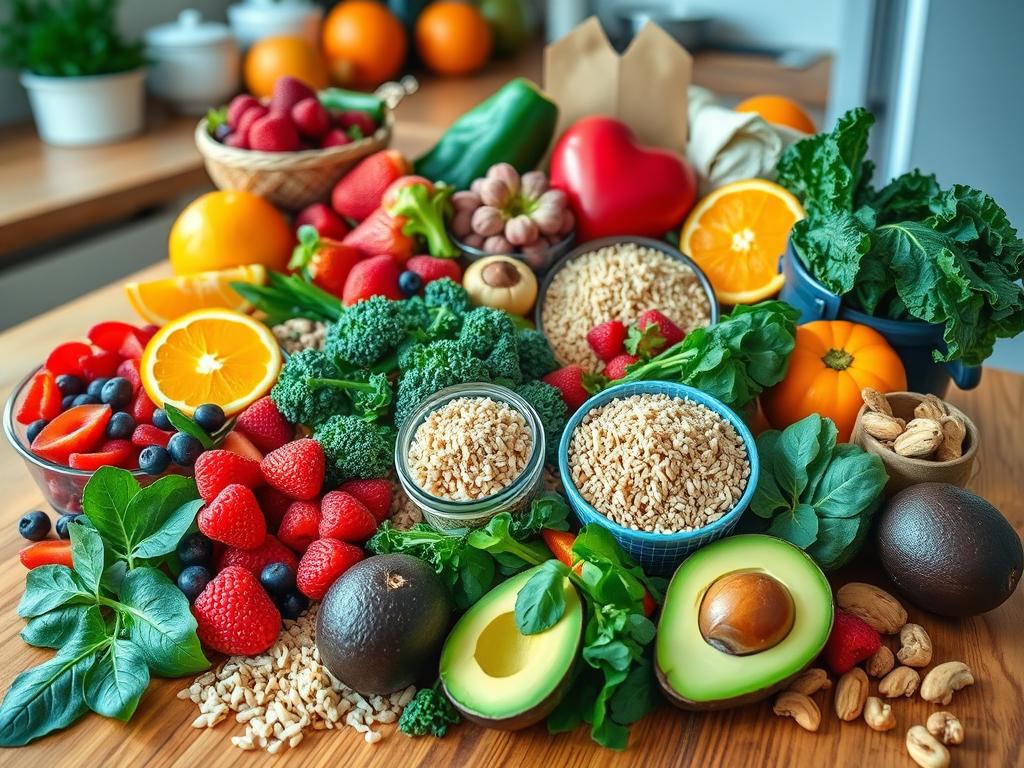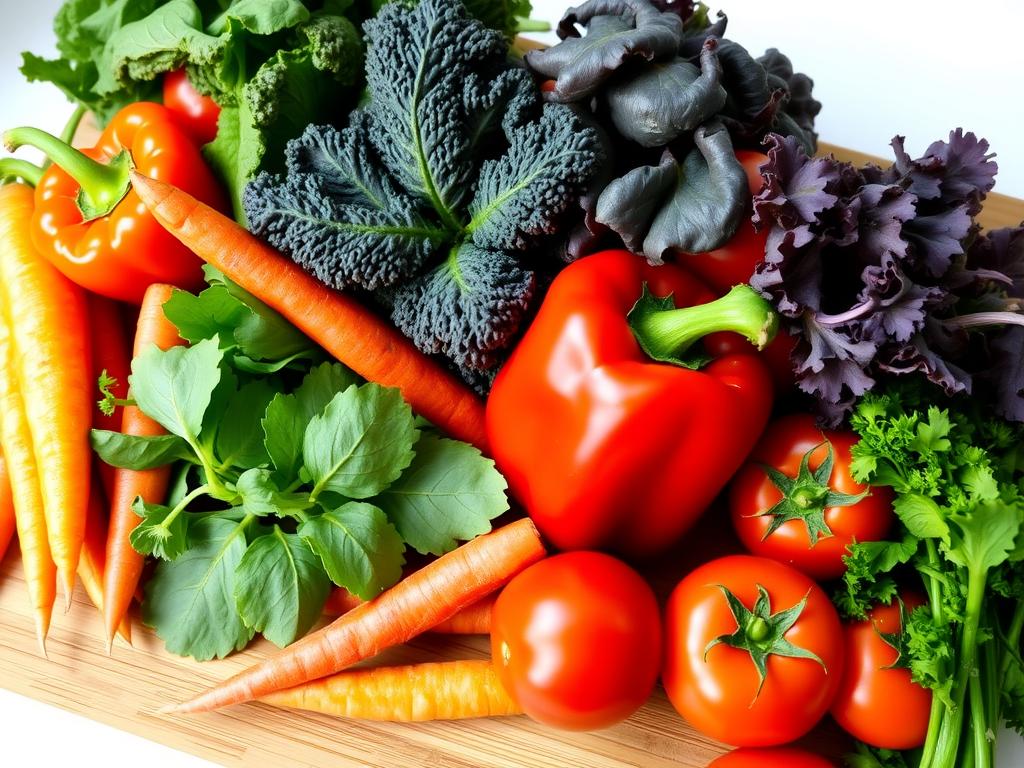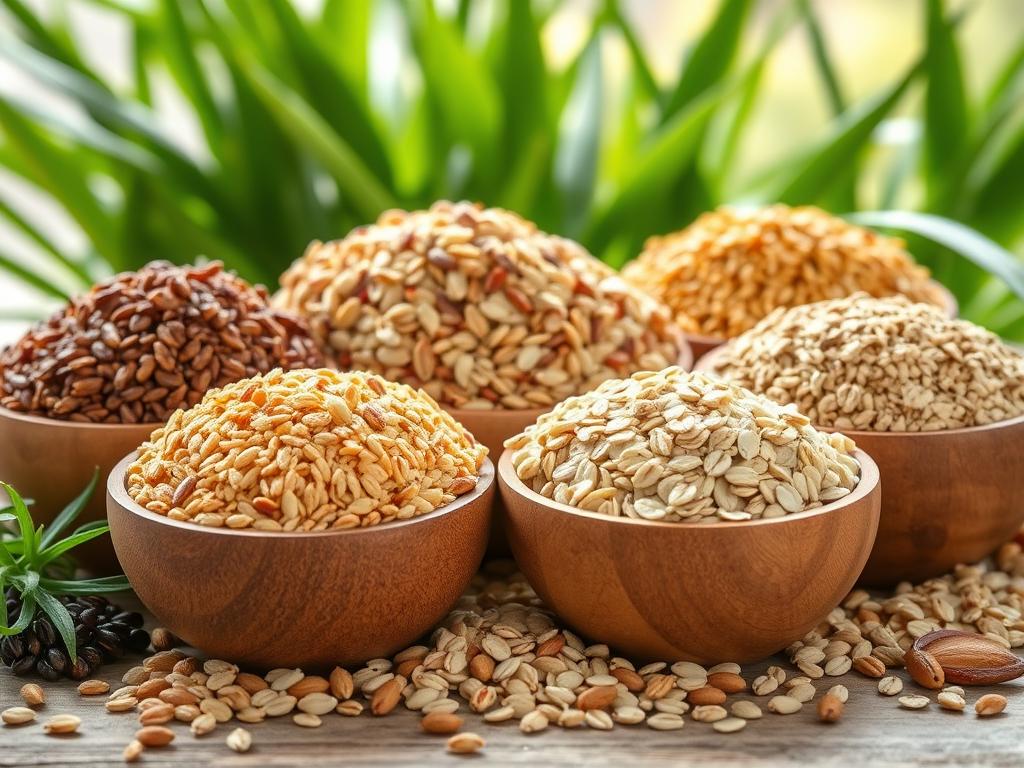Did you know that heart disease remains the leading cause of death in the United States, claiming over 697,000 lives annually? This staggering statistic highlights the critical importance of diet in maintaining cardiovascular health. Incorporating the right foods into your meals can significantly mitigate the risks associated with heart disease. By focusing on top foods for a healthy heart and body, we can make informed choices that promote overall wellness.
Heart-healthy foods are more than just a collection of nutritious items; they represent a comprehensive approach to eating that supports both heart and body. By integrating a variety of nutrient-dense foods, including fruits, vegetables, whole grains, and healthy fats, we create a balanced diet that nourishes our hearts while enhancing overall health. Research shows that an extra serving or two of whole grains can decrease coronary heart disease risk by approximately 10-20%, making these foods for a healthy heart and body essential in our everyday lives.
Additionally, studies emphasize the role of nuts in lowering bad cholesterol and supporting heart health. With small dietary changes like incorporating more plant-based options, we can pave the way to a healthier lifestyle. As we explore specific categories of heart-friendly foods in the following sections, remember that each bite counts toward a stronger, healthier heart.
Key Takeaways
- Heart disease is the leading cause of death in the U.S., emphasizing the need for a heart-healthy diet.
- Increased intake of leafy greens can significantly benefit cardiovascular health.
- Whole grains and plant-based foods lower the risk of coronary heart disease.
- Regular consumption of nuts can decrease bad cholesterol levels.
- Small dietary changes can lead to significant health benefits.
- Including fruits and vegetables is essential for overall heart health.
Understanding Nutrition Heart and Body
Achieving optimal heart health relies heavily on a balanced diet rich in essential nutrients. The importance of a heart-healthy diet cannot be overstated, as it plays a significant role in preventing heart disease, cholesterol issues, and high blood pressure. When individuals prioritize their nutrition, they can positively impact their overall cardiovascular well-being.
Importance of a Heart-Healthy Diet
A heart-healthy diet typically emphasizes the consumption of:
- Fruits and vegetables
- Whole grains
- Healthy fats from sources like olive oil and nuts
- Lean proteins, including fish and poultry
Incorporating these foods not only offers key nutrients for heart health but can also help manage weight and reduce inflammation. For optimal results, the average recommended calorie intake suggests that less than 6% of total daily calories should come from saturated fat. The American Heart Association advises limiting sodium intake to no more than 2,300 mg a day, with an ideal target of 1,500 mg for adults.
Nutrients That Benefit the Heart
Several vital nutrients contribute to better heart health, including:
- Fiber: Aids in lowering cholesterol levels
- Potassium: Helps manage blood pressure
- Antioxidants: Found in various fruits and vegetables that combat oxidative stress
For individuals looking to enhance their heart health, it’s crucial to prioritize whole grains in their diet, as at least half of the grains consumed should come from whole sources. Staying mindful of portion sizes further supports cardiovascular health. Additionally, opting for low-fat or fat-free dairy products can aid in achieving healthy protein intake while minimizing saturated fat consumption.

Fruits That Promote Heart Health
Incorporating a variety of fruits into your diet can greatly enhance heart health. These heart-healthy fruits are not just delicious; they provide essential nutrients and antioxidants that support cardiovascular well-being. The following sections will explore some of the best fruits to include for optimal heart health.
Berries: Antioxidants at Their Best
Berries are among the top contenders when it comes to promoting heart health. Rich in anthocyanins, they reduce oxidative stress and inflammation, factors known to contribute to heart disease. One cup of blueberries delivers approximately 4 grams of dietary fiber, which aids in lowering cholesterol levels. Raspberries take it a step further with an impressive 8 grams of fiber per cup. Blackberries are not only delicious but also offer more than one-third of the Daily Value for vitamin C per cup, making them a valuable addition for those looking to improve their heart health.
Citrus Fruits: A Boost of Vitamin C
Citrus fruits play a significant role in cardiovascular health due to their high vitamin C content. For instance, one cup of papaya chunks provides nearly 100% of the Daily Value for vitamin C, which is essential for maintaining healthy blood vessels and reducing cholesterol levels. Adding citrus fruits like oranges and grapefruits to your diet can enhance overall heart function and support a healthy immune system.
Apples: The Daily Snack for Heart Benefits
Apples are an excellent option for anyone looking to support heart health. These fruits are not only high in fiber but also contain polyphenols that may reduce cardiovascular risk. Regular consumption of apples has been linked to positive heart health outcomes. For more detailed information on the heart benefits of apples, check out this resource. Including apples as a daily snack can help you achieve a balanced diet and promote overall wellness.
| Fruit | Fiber (grams per cup) | Vitamin C (% Daily Value) |
|---|---|---|
| Blueberries | 4 | 24 |
| Raspberries | 8 | 54 |
| Blackberries | 7 | 33 |
| Papaya | 2 | 100 |
Vegetables for a Stronger Heart
Incorporating a variety of vegetables into your diet plays a crucial role in maintaining heart health. Among the array of heart-healthy vegetables, leafy greens, cruciferous options, and tomatoes stand out for their exceptional benefits. Each provides essential nutrients that help combat heart disease, one of the leading causes of mortality globally.
Leafy Greens: Powerhouses of Nutrients
Leafy greens such as spinach, kale, and collard greens are remarkable for their nutrient density. The leafy greens benefits include high levels of vitamins A, C, and K, along with fiber and antioxidants. Notably, collard greens offer over 130% of the Daily Value for vitamin K in just one cup. These nutrients contribute to lowering blood pressure and enhancing arterial function, making them vital for heart health.
Cruciferous Vegetables: Broccoli and Beyond
Cruciferous vegetables, including broccoli, cauliflower, and Brussels sprouts, are rich in phytochemicals that combat inflammation. These antioxidants play a significant role in reducing the risk of heart disease. Regular consumption of cruciferous vegetables supports overall heart function, showcasing the importance of including these vegetables in daily meals.
Tomatoes: Lycopene for Heart Protection
Tomatoes, celebrated for their vibrant color and taste, are exceptionally rich in lycopene, an antioxidant studied for its impact on lycopene for heart health. Research indicates that lycopene may lower cholesterol levels and improve cardiovascular health. Regularly adding tomatoes to salads, sauces, or side dishes can significantly enhance heart health while adding flavor to meals.

| Vegetable | Key Nutrients | Heart Health Benefits |
|---|---|---|
| Spinach | Vitamins A, C, K, Folate | Supports blood pressure regulation |
| Kale | Vitamins A, C, K, Antioxidants | Reduces inflammation |
| Broccoli | Vitamins C, K, Fiber | Enhances cardiovascular function |
| Collard Greens | Vitamin K, Folate | Improves arterial health |
| Tomatoes | Lycopene, Vitamin C | Lowers cholesterol levels |
Emphasizing the intake of these heart-healthy vegetables can lead to improved heart function and overall health. Make a conscious effort to include a variety of them in your meals, reaping the benefits they offer.
Whole Grains: The Heart’s Best Friend
Whole grains are an essential part of a heart-healthy diet. Their numerous benefits compared to refined grains make them a top choice for those looking to improve cardiovascular health. Research indicates that whole grains can significantly reduce the risk of heart disease and stroke. They contain all parts of the grain—the bran, germ, and endosperm—allowing them to provide vital nutrients, particularly dietary fiber, which is crucial for lowering cholesterol levels. Unlike refined grains, which often lack this fiber, whole grains have proven beneficial for overall heart health.
Benefits of Whole Grains Over Refined Grains
When comparing refined vs whole grains, the advantages of whole grains stand out. They have a higher fiber content that aids in maintaining healthy digestion and can help manage weight. Here are some core benefits:
- Lower risk of heart disease
- Improved blood pressure
- Enhanced cholesterol levels
- Support for healthy digestion
- Reduced risk of type 2 diabetes
Incorporating whole grains into your meals can promote stable blood sugar and blood pressure levels over time.
Top Whole Grains to Include in Your Diet
Including a variety of heart-healthy grains can elevate your diet. Consider adding these options:
| Whole Grain | Fiber Content (per cooked cup) | Additional Benefits |
|---|---|---|
| Oats | 4 grams | Rich in antioxidants that support heart health |
| Quinoa | 5 grams | Gluten-free, high in protein and essential minerals |
| Brown Rice | 3.5 grams | Good source of magnesium, supports blood pressure control |
| Barley | 6 grams | Helps reduce cholesterol levels and improve heart health |
| Farro | 6 grams | Ancient grain, packed with iron and protein |
Integrating these whole grains into daily meals can enhance heart-healthy choices significantly. Look for products labeled as “whole” or “whole grain” as the first ingredient on their nutrition labels.

For more insights into nutrition, including the role of antioxidants like vitamin E, consider how these nutrients fit into your overall health strategy.
Healthy Fats That Support Heart Health
Incorporating healthy fats into your diet is vital for maintaining overall cardiovascular health. Research highlights that not all fats are detrimental; certain high-fat foods can contribute positively to heart health. This section will explore key sources of these beneficial fats, focusing particularly on avocado benefits, nuts, seeds, and olive oil nutrition.
Avocados: Creamy and Nutrient-Dense
Avocados stand out as a rich source of monounsaturated fats, which can effectively lower bad cholesterol levels. With about 80% of their composition being fat, avocados offer a significant dose of healthy fats for heart health. A study revealed that consuming just one avocado daily for five weeks led to improved cholesterol profiles among participants. Additionally, they provide 15% of the Daily Value of potassium per serving, promoting overall well-being and heart health.
Nuts and Seeds: Small but Mighty
Nuts and seeds are remarkable sources of healthy fats, fiber, and protein. Regular consumption is linked with a lower risk of obesity and heart disease. These small powerhouses contain polyunsaturated fats, essential for reducing total cholesterol and LDL cholesterol levels. Including an ounce of nuts as a snack can be a valuable addition to your diet. Chia seeds, in particular, are packed with omega-3 fatty acids and fiber, assisting in lowering blood pressure and inflammation.
Olive Oil: The Heart-Healthy Cooking Oil
Extra virgin olive oil deserves a prime spot in any heart-healthy kitchen. High in oleic acid and anti-inflammatory properties, it is a staple of the Mediterranean diet celebrated for its health benefits. Incorporating olive oil nutrition into your meals not only adds flavor but also supports cardiovascular wellness. Using heart-healthy oils like olive oil for cooking can help replace less beneficial fats in your diet.
Be mindful to limit saturated fat intake to less than 10% of your total calories, as recommended by the American Heart Association. Emphasizing the use of healthy fats from avocados, nuts, seeds, and olive oil can significantly contribute to a balanced diet, supporting heart health effectively.
For further information on heart-healthy eating habits, check out this guide.
| Food Item | Healthy Fats Type | Primary Benefits |
|---|---|---|
| Avocado | Monounsaturated Fats | Lowers bad cholesterol, promotes potassium intake |
| Nuts | Polyunsaturated Fats | Reduces heart disease risk, provides fiber |
| Chia Seeds | Omega-3 Fatty Acids | Lowers blood pressure, reduces inflammation |
| Olive Oil | Monounsaturated Fats | Anti-inflammatory properties, supports heart health |
Lean Proteins to Fuel Your Body
Incorporating lean proteins into your diet can greatly enhance heart health. Selecting the right sources ensures you receive essential nutrients while minimizing unhealthy fats. Lean proteins for heart health provide necessary building blocks for the body and reduce the risks associated with higher-fat alternatives.
Fish: Omega-3 Fatty Acids and Their Benefits
Fatty fish, particularly varieties like salmon and sardines, are excellent sources of omega-3 fatty acids. Among the omega-3 benefits are reduced blood pressure and lowered triglyceride levels, which directly contribute to improved cardiovascular wellness. In addition to fatty fish, tilapia serves as a lean alternative with very low fat content, making it suitable for various dishes.
Poultry: A Lean Alternative to Red Meat
Poultry for heart health offers a nutritious alternative to red meat. Boneless skinless chicken breasts deliver lean protein without excessive saturated fat, fitting perfectly into a heart-conscious diet. Ground chicken and ground turkey are high-protein choices that can be used in multiple recipes. Lean cuts of pork, such as pork tenderloin, also meet dietary standards for lower fat intake.
| Protein Source | Type | Fat Content (per 3.5 oz) |
|---|---|---|
| Salmon | Fatty Fish | Approx. 13g |
| Tilapia | Lean Fish | Approx. 2g |
| Boneless Skinless Chicken Breast | Poultry | Approx. 3g |
| Pork Tenderloin | Pork | Approx. 4g |
| Ground Turkey | Poultry | Approx. 7g |
| Ground Beef (90% Lean) | Beef | Approx. 10g |
Embracing a diet rich in lean proteins is paramount for maintaining heart health and ensuring a balanced intake of nutrition. Making informed choices can empower individuals to enhance their wellbeing and cardiovascular function.
Delicious Recipes to Incorporate Heart-Healthy Foods
Transforming heart-healthy foods into delicious meals can make a significant difference in your dietary habits. Start your day right with breakfast ideas like oatmeal topped with fresh berries or a vibrant avocado toast. These meals not only kickstart your morning but also ensure a healthy intake of nutrients. For more quick breakfast inspiration, you can explore energizing options that fit a busy lifestyle.
Breakfast Ideas for a Heart-Healthy Start
Following a nourishing breakfast, lunch and dinner options can continue the pattern of delicious heart-healthy eating. Consider recipes such as chicken shawarma with skinless chicken breasts and spices or cod fish fillets paired with potatoes and carrots. Utilizing lean proteins, whole grains, and plenty of vegetables creates balanced meals that enhance your heart health and taste great.
Lunch and Dinner Options That Delight
When it comes to snack time, healthy snacks can be delightful and satisfying. Think of wholesome choices like nuts, seeds, or fresh fruits that keep your energy up between meals. For example, a spinach muffin recipe not only serves as a tasty snack but also packs in the vitamins and minerals that contribute to heart well-being. Embracing these heart-healthy recipes in your daily life can lower the risk of cardiovascular disease while making healthy eating enjoyable.











